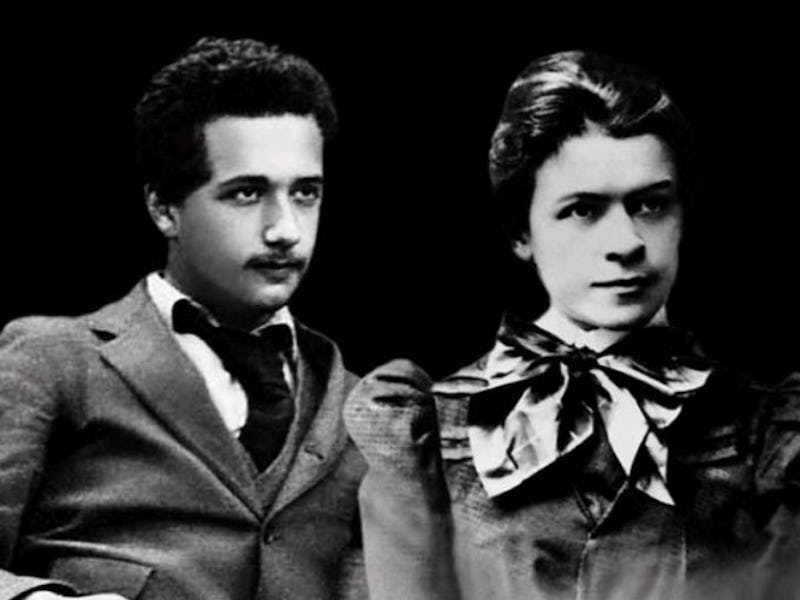Did Einstein Cheat His Wife Out of a Nobel?
Einstein’s first wife, Mileva Marić, may have been instrumental in discovering special relativity.

When Einstein suspected that he would win the Nobel Prize for his paper showing time is relative — the infamous E = mc2 — he dumped all his prize money to his first wife, Mileva Marić.
Some argue that this is was merely a form of alimony and child support, not even an uncommon one among divorced Nobel winners. But others — including the not-so-implicit arguments made by National Geographic’s Genius — argue that these payments represented atonement for Einstein’s alleged decision to claim his wife’s efforts towards his discoveries as his own.
First things first: There’s no hard evidence that Marić collaborated in a meaningful way to Einstein’s research, nor can it be irrefutably shown that Einstein stole her ideas. But an analysis of the letters that they wrote to each other has given enough weight to the idea that Marić played an important role in developing the famous thought experiments that are attributed solely to Einstein.
This theory is the basis for Marić’s portrayal in Genius, where Marić grows increasingly frustrated as her husband takes her ideas and runs with them, eventually overlooking her contributions and celebrating their success as his own.
The foundation for the argument of Einstein as idea-thief comes from some of Einstein’s letters to Marić. In particular, he wrote in one 1901 letter, “How happy and proud I will be when the two of us together will have brought our work on the relative motion to a victorious conclusion!” Some argue that this — along with other letters where Einstein uses phrases like “our research” — provide support for the notion that Marić was more involved in her husband’s scientific endeavors than history suggests.
The National Geographic version of "Genius" takes the side that argues Albert Einstein's wife, Mileva, was instrumental to his Nobel Prize-winning ideas.
Critics of this idea, who remain unconvinced that Marić could have helped, point out that Einstein wrote about detailed scientific concepts to Marić much more than she did to him. They argue that Einstein was merely bouncing ideas off of his wife, not working with her in a scientific partnership. But just as Einstein’s word choice doesn’t necessarily prove that Marić contributed, the absence of technical terms in her letters doesn’t mean that she didn’t — particularly because most of Marić’s letters were destroyed, along with some earlier drafts of Einstein’s work.
Critics also like to point out that Marić failed out of school, arguing that her understanding of math and physics must have paled in comparison to Einstein’s. It’s true that Marić never received a diploma, but it’s important to note that she took her final exams — her entrance and midterm grades were better or the same as Einstein’s — while pregnant with her and Einstein’s first child, a daughter who either died or was adopted shortly after birth. Also, Marić was the only woman in her class and the only one who failed the final exams that were given by older male professors who may have wanted to keep their field masculine.
Again, these don’t prove that Marić was responsible for discoveries attributed to Einstein, but it means that the common arguments saying that she couldn’t have are bunk. Coupled with the fact that Einstein reportedly saw Marić as his intellectual equal, it is certainly possible that Einstein collaborated with his wife on much, if not all, of his research.
Some of Einstein’s letters to Marić suggest that certain scientific endeavors were collaborative while others were not. In several letters, Einstein was very specific about whose ideas were whose. In one, he wrote “The local Prof. Weber is very nice to me and shows interest in my investigations. I gave him our paper,” referring to two separate projects.
Looking at multiple letters that refer to the same project over time, it is likely that Marić played an early collaborative role in some ideas, but as time went on Einstein viewed them more and more as his own. All of Einstein’s papers bore his name and his name alone, even though it’s accepted by both sides of the debate that Marić did much of Einstein’s research, spending time at the library gathering information that he — or they — would later use.
Whether or not Einstein stole his wife’s work at the turn of the twentieth century, one thing is accepted by both sides of the debate: that Marić was an instrumental part of Einstein’s professional development.
You May Also Like:At This Point, Einstein is Basically the Villain in GeniusWho Was Mileva Maric? What to Know About Einstein’s First WifeWhy the Element Marie Curie Discovered Also Killed HerGenius’ Struggles to Depict Einstein’s Genius, Ironically